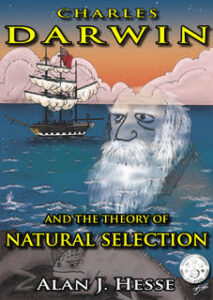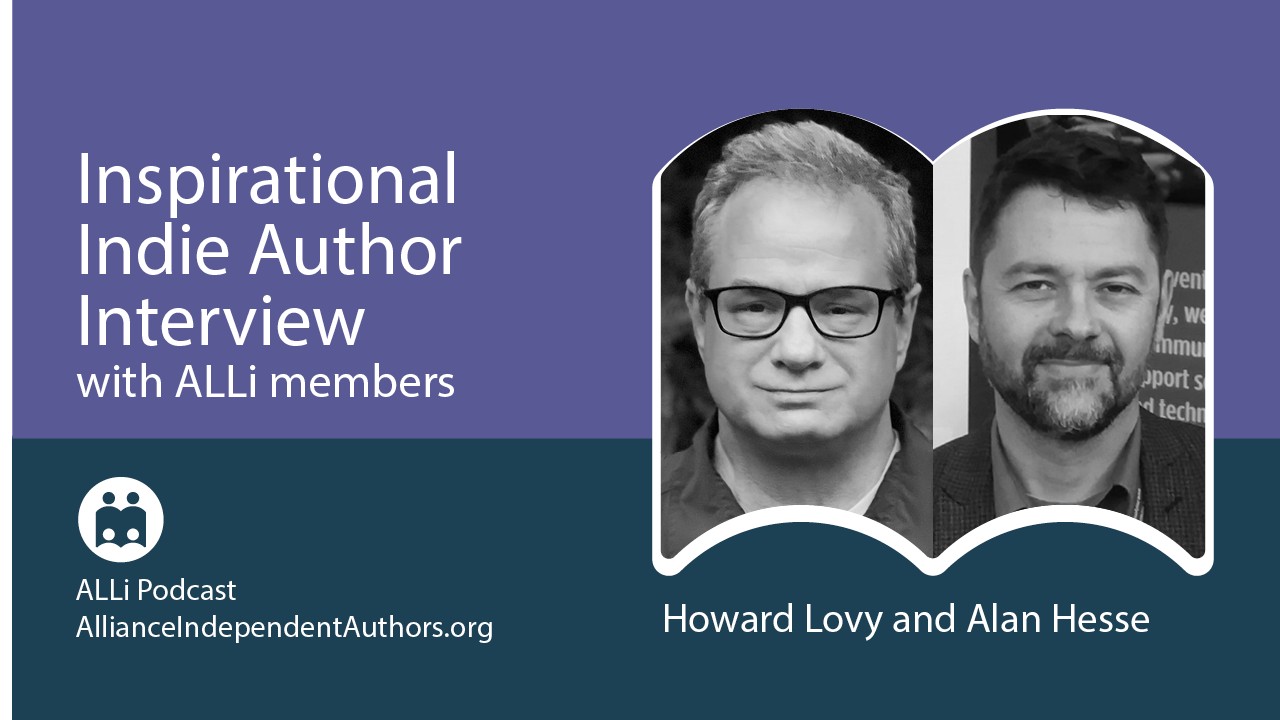My ALLi author guest this episode is Alan Hesse, a conservationist who found his way to indie publishing through his ability to reach kids and adults in his drawings. Alan's graphic novels about climate change entertain readers while also teaching them that there is something each of them can do to help save the earth.
 ALLi's Inspirational Indie Author interviews are sponsored by Kobo Writing Life, a global, independent ebook and audiobook publishing platform that empowers authors with a quick and easy publishing process and unique promotional opportunities. To reach a wide readership, create your account today! Thank you, Kobo, for your support of this podcast.
ALLi's Inspirational Indie Author interviews are sponsored by Kobo Writing Life, a global, independent ebook and audiobook publishing platform that empowers authors with a quick and easy publishing process and unique promotional opportunities. To reach a wide readership, create your account today! Thank you, Kobo, for your support of this podcast.
Find more author advice, tips, and tools at our Self-Publishing Author Advice Center, with a huge archive of 2,000+ blog posts, and a handy search box to find key info on the topic you need.
We invite you to join our organization and become a self-publishing ally, if you haven’t already. You can do that at allianceindependentauthors.org.
Inspirational Indie Author Interview. Alan Hesse
On the Inspirational Indie Authors #Podcast, @howard_lovy interviews @AlanJamesHesse1, a conservationist who uses graphic novels to illustrate climate change. Share on XDon't Miss an #AskALLi Broadcast
Subscribe to our Ask ALLi podcast on iTunes, Stitcher, Player.FM, Overcast, Pocket Casts, Spotify or via our RSS feed:
Inspirational Indie Author Interview. Alan Hesse: About the Author
 Based in biodiversity-rich Ecuador, Alan J. Hesse is a veteran conservation biologist, author-illustrator and climate educator. Alan specializes in distilling complex environmental topics into entertaining resources designed to facilitate understanding and engagement. He is the author and illustrator of ten educational children’s books, among which is the Captain Polo comic book series about climate change. Alan is also the founder of the Captain Polo Climate Academy, a globally reaching initiative to spread climate education and support schools in their teaching of this subject. Check it all out on Alan’s website, AJH Education Comics and Cartoons.
Based in biodiversity-rich Ecuador, Alan J. Hesse is a veteran conservation biologist, author-illustrator and climate educator. Alan specializes in distilling complex environmental topics into entertaining resources designed to facilitate understanding and engagement. He is the author and illustrator of ten educational children’s books, among which is the Captain Polo comic book series about climate change. Alan is also the founder of the Captain Polo Climate Academy, a globally reaching initiative to spread climate education and support schools in their teaching of this subject. Check it all out on Alan’s website, AJH Education Comics and Cartoons.
About the Host
Howard Lovy has been a journalist for more than 35 years, and now amplifies the voices of independent author-publishers and works with authors as a developmental editor. Howard is also a freelance writer specializing in Jewish issues whose work appears regularly in Publishers Weekly, the Jewish Telegraphic Agency, and Longreads. Find Howard at howardlovy.com, LinkedIn and Twitter.
If you’re a published indie author who would like to be interviewed by Howard for the Inspirational Indie Authors podcast, you need to be a member of the Alliance of Independent Authors.
Then contact Howard, including your membership number, explaining why you’re an inspirational indie author and what inspires you.
If you haven’t already, we invite you to join our organization.
Read the Transcripts: Inspirational Indie Author Interview. Alan Hesse
Howard Lovy: My guest this episode is Alan Hesse, a conservationist who found his way to indie publishing through his ability to reach kids and adults in his drawings.
Alan's graphic novels about climate change entertain readers while also teaching them that there is something each of them can do to help save the earth. I'll let Alan Hessey tell his story.
Alan Hesse: Okay. Hi everybody, my name is Alan Hesse. I'm an indie author of comic books, children's books, especially graphic novels and comic books, always focusing on environment, and now mainly climate change because of my background as a conservation biologist, and lately a climate educator.
Howard Lovy: From an early age, Alan learned how to think globally. Because he lived it.
Alan Hesse: Well, I was very fortunate to have grown up very internationally. My father worked with the UN, was the {inaudible} scientist, and that meant he was posted at many different places, all of them in global south countries, developing countries. So, I was exposed to that very diverse background of ethnicities, and cultures, and landscapes from a very early age, and that definitely had its challenges growing up, but it mainly had advantages because it gave me a very good world view. It just gave me an amazing sort of perception of diversity, and one thing led to another, and I basically have lived in the global south most of my life, and I am still living there.
Howard Lovy: Alan turned an early interest in wildlife and animals into a career, and later his love for drawing was added into the mix, which led to his later career as a graphic novelist.
Alan Hesse: I was always drawn to wildlife and animals from a very early age, and I chose a career in wildlife and in conservation, except at the time that I was ready to choose that, the conservation subject wasn't really available. I'm talking about here, the very early nineties in the UK, at least at the university I went to, which was in Nottingham, they didn't have conservation as a subject. It wasn't a thing back then as it is today. So, I chose animal behavior, zoology and psychology, which is a joint honors course, as a first degree, and that has very little to do with what I do today. But it gave me an opportunity to get on the track, and in parallel I had always enjoyed drawing comics and little cartoons just for fun.
And later, much, much later when I was embarked on the conservation career, I discovered a meeting point for the two and realized that those kinds of illustrations are a very powerful way of expressing messages, and of communicating about important things, and for me, what's important is environmental things.
So, I started creating content on environment, always with a conservation angle, using my particular expression, which was comics and cartoons. This led to me, much later, making my own comic books, so that's how I got into the indie author kind of space, and that's where it all comes together.
Howard Lovy: But before we get into Alan's indie author career, it's important to look at why and how he first became excited about conservation. It all began with an expedition into the Amazon.
Alan Hesse: When I graduated my first degree, I set up an expedition with some guys, because that's very much a tradition in Britain. With any kind of subject to do with the natural sciences or the social sciences, you set up an expedition, and we did that, and we went to the Bolivian Amazon. That was, for me, an eye opener because it was my first time to Latin America and we were three months in the Amazon, and that's where I witnessed the pressure on that particular environment; deforestation, the human rights abuse on indigenous groups, alcohol, you know, all of these pressures hit home. And I discovered, oh my goodness, here's a path for me to do something using my passion for wildlife and nature. This obviously needs to take care of nature.
So, back in the 19th century, zoologists were all about collecting and discovering, but today it's all about preserving, and that was very clear to me.
Howard Lovy: It was so clear to him that he stayed in Bolivia to work long after the expedition was over.
Alan Hesse: Well, one of the expedition's objectives was to find a very rare species of parrot, which hadn't been seen since the 19th century, and we didn't find it, but I kind of stayed on. I went back to Bolivia after the expedition and stayed, and using local contacts and other things, I found this very rare parrot, and I joined a little grassroots organization, which at the time was very small, and other volunteers. We raised some money and we managed to start a conservation project for this very rare parrot of which there were only a hundred individuals or so in the wild.
I ended up staying in Bolivia for 20 years, and so what started as a three-month expedition led to a 20-year commitment to that particular species, which is kind of crazy, but of course along the way I also did a lot of other work in that country in different areas. I always say, I learned conservation through very much seat of the pants, you know, from bottom up. I had no training in conservation at the time, but then 10 years afterwards it became much more common to see that on the university's curricula, and I did a master's in conservation biology at a different university, and that kind of sealed that career path.
Howard Lovy: From there, Alan fell into drawing wildlife almost by accident.
Alan Hesse: The drawing was something that came around the year 2000, when I had some contacts with WWF in Bolivia, and they said, we need some drawings for a calendar about fish.
And I said, oh, hey, I can do that for you, and it was completely free of charge because I had no confidence in my ability to do anything useful with these sketches. But I saw the result and I thought, hey, I could do something with this, and so that put me on a parallel path, which is hard to explain to other conservation scientists in a conference, for example.
It's hard to explain why I have this parallel path, but when I do, they all get it, and they think it's great. So, that kind of give me a little something extra.
Howard Lovy: And with that something extra, something clicked inside Alan, here was a great way to educate others about conservation.
Alan Hesse: It was definitely communication and education, Howard. I thought, this is material that kids would enjoy, and in fact adults too actually, and the whole idea is to get some complicated information but not speak to those who already know about it.
When it comes to conservation, we need to go outside the specialists, because they already know. We need to go outside and speak to a broader audience, people who may not have considered the pressures and the problems, and also the solutions.
So, that was always the basis, to get beyond that audience of people in the know and get it out there in a way that's fun, in a way that's entertaining and engaging. So, that's the basis of it.
Howard Lovy: With his love for conservation and drawing, Alan felt that everything came together for him in graphic novel storytelling about climate change.
Alan Hesse: Yeah, for sure. When I started doing actual storytelling with my drawings, through graphic novels, I love to put in diversity of landscapes with a lot of realistic detail, and characters, all of which I love to have them very authentic. So, I use my own geographic background and experience of different cultures and countries. I also like to put foreign languages into my scripts, into my dialogues.
With Google Translate today, you can even put non-Latin characters, languages which use non-Latin alphabets, and it spits that out in the right format, and so I love to do that and put footnotes. It just gives a feeling of authenticity to the story, which goes along with the fiction storytelling and also the non-fiction, which is always in there, because the non-fiction dovetails in and out of my fiction storytelling. Because at the end of the day I'm trying to use this as an educational tool, so it has to have non-fiction as well.
Howard Lovy: Alan began with non-fiction, but eventually invented characters like Captain Polo to tell his stories.
Alan Hesse: Well, initially they were standalone, one-off stories, one with a complete non-fiction comic about Charles Darwin and the theory of natural selection, and I was very fortunate to have done that under commission for a foundation in the Galapagos Islands, and it was about Darwin's voyage to the Galapagos Islands, and then his later development of the theory. That was a very standalone, very non-fiction work.
It led to, more recently, a focus on climate. So, now I have my adventures of Captain Polo. Captain Polo is a cartoon polar bear who's the hero of these comics, and that is now my main focus. So, I have four of those books and working on the fifth one. So, that is really my interest area now, it's climate literacy and climate education.
And when you look at the news, there's a lot of despair, there's a lot of big news about this now, increasingly so. So, I feel ever more justified in talking about this subject in a way that's entertaining, that's light, that offers solutions. It's all based on research, of course. So, that's really my area of interest right now.
Howard Lovy: Alan discovered soon enough that Indie publishing was the best way to go for what he was trying to accomplish.
Alan Hesse: I did try traditionally published with my comic about Darwin, about Charles Darwin, and also the first book of the climate change series.
The problem with that, it was itself a very small indie publisher in the UK, and after many years of practically very low sales, I realized that the person, a very lovely lady, but she was on her own. She didn't have a team and had no marketing budget, or indeed any marketing knowledge, and she told me this very openly after a couple of years, and I realized that traditional publishing under those circumstances wasn't going to work for me. So, that's when I pulled out and I went for self-publishing, and that, as everybody listening on this podcast, who is an indie author, will know is a huge learning curve.
I had to learn it from zero, and I'm still learning. The whole indie publishing pathway is, yeah, I could talk for hours about that.
Howard Lovy: One issue that Alan faces that other authors do not is the formatting of eBooks. Some formats just do not work for graphic novels.
Alan Hesse: Yeah, when you get to eBooks, when you start looking at eBooks, then the graphic novels, they have to be fixed format, but that puts restrictions on what kind of eBook retailers will take it, for example. So, it's very different, I do it all myself, not only do I do my own books, but I also design them. I design them ready, like print/press ready, and I also do my own eBook, and all of that has taken me years to learn how to do. I had to learn things like Adobe InDesign and all these sophisticated software, and I do my own eBooks now. For example, when I put the books wide on Draft2Digital, or other aggregators like that, a lot of the online stores will not accept my graphic novels because they're fixed format rather than being flow.
So, an author of prose doesn't have that problem, because graphic novels are obviously image intensive and there's some technical challenges there.
Howard Lovy: Alan hopes that at the very least his readers get the message that not only is climate change a real problem, but there are real solutions out there.
Alan Hesse: I hope they come away with an increased awareness and knowledge about the subject matter, and a sense that there is always a solution and that the books include things like glossies, they include technical sections at the back with more information, and practical actions that people can do, that kids can do.
So, there's a very optimistic feel of solutions, and it's about the understanding the problem, and understanding the solutions, and understanding what you can do. So, it's like an actionable thread in my books. They're not just stories that end with a problem. On the contrary, it leads into all kinds of, I hope people come away inspired.





